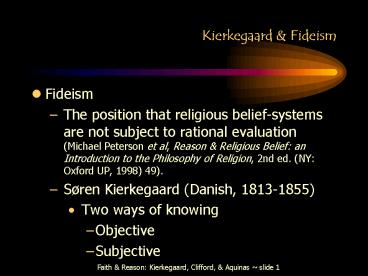Kierkegaard - PowerPoint PPT Presentation
1 / 23
Title:
Kierkegaard
Description:
Kierkegaard & Fideism Fideism The position that religious belief-systems are not subject to rational evaluation (Michael Peterson et al, Reason & Religious Belief: an ... – PowerPoint PPT presentation
Number of Views:262
Avg rating:3.0/5.0
Title: Kierkegaard
1
Kierkegaard Fideism
- Fideism
- The position that religious belief-systems are
not subject to rational evaluation (Michael
Peterson et al, Reason Religious Belief an
Introduction to the Philosophy of Religion, 2nd
ed. (NY Oxford UP, 1998) 49). - Søren Kierkegaard (Danish, 1813-1855)
- Two ways of knowing
- Objective
- Subjective
2
Kierkegaard Fideism
- Which is appropriate for religious faith?
- Religious truth the venture which chooses an
objective uncertainty with passion of the
infinite (982nd).
3
- drawing of Kierkegaard
- by his 2nd cousin, Niels Christian Kierkegaard
- c. 1840
- Royal Library, Copenhagen
4
Kierkegaard Fideism
- Faith risk dread
- Faith the absurd
- Critical evaluation of Fideism
- How does one decide which religious faith to jump
to? (James Jones Peoples Temple, Jonestown,
Guyana, 1978)
5
Kierkegaard Fideism
- How does one arbitrate conflicts between a
religious belief-system science? - The value of Fideism religious faith is more
than assent to cognitive claims involves passion
trust relationship with a person
6
Cliffords strong rationalism
- Strong rationalism - the position that in order
for a religious belief-system to be properly and
rationally accepted, it must be possible to prove
that the belief-system is true (Peterson et al
45). - William Clifford (English, 1845-1879)
- Story about ship owner
7
Cliffords strong rationalism
- Conclusion The ship owner had no right to
believe on such evidence as was before him it
was morally wrong for him to believe that it was
safe to sail (Peterson 802nd).
8
Cliffords strong rationalism
- Clifford anticipates some objections
- The actions were immoral, not the beliefs.
- Cliffords response Belief action cannot be
separated beliefs often, almost always, spill
over into action - Hence all beliefs have a social dimension they
affect the lives of others.
9
Cliffords strong rationalism
- This is why beliefs may be morally good or bad.
- Therefore one has a moral obligation to accept
only those beliefs based on evidence careful
reasoning (Peterson 842nd). - If evidence is lacking, one should withhold
belief.
10
Cliffords strong rationalism
- Application of his position to religion?
- Critique of Cliffords position
- One may make an intellectual mistake not be
morally wrong for making such a mistake. - There is a difference between an intellectual
mistake a moral evil.
11
Cliffords strong rationalism
- We often must act without sufficient knowledge
(e.g., practice of medicine). - In his tacit application of his position to
religion, he assumes that religious faith is a
leap beyond reason evidence. - John Polkinghorne You dont have to commit
intellectual suicide to be a person of religious
faith.
12
Critical rationalism
- Critical rationalism - the position that
religious belief-systems can and must be
rationally criticized and evaluated although
conclusive proof is such a system is impossible
(Peterson et al 53). - Cover Ibn Rushd here
13
Aquinas on faith reason
- Aquinas (Italian, 1225-1274)
- Two kinds of propositions about God
14
Aquinas on faith reason
- Arguments for the appropriateness that although
truths about God are available through human
reason, these same truths are also available
through revelation (reason revelation)
15
Aquinas on faith reason
- 1. The pragmatic argument
- 2. Argument based on the frailty of human reason
- Arguments for the appropriateness that there are
some truths about God which are beyond human
reason (revelation only) - 1. Argument based on the satisfaction of the
transcendent nature of humans
16
Aquinas on faith reason
- 2. Argument for richness of our knowledge of God
- 3. Argument for plausibility that knowledge of
God would be beyond the abilities of human reason - On the relationship between religious faith
reason the harmony position (Peterson et al
712nd) - Principle vs practice
17
Aquinas on faith reason
- Concluding overview of Aquinass position
- 1. Faith precedes reason
- 2. Reason alone cannot arrive at many of the
propositions of religious faith but once these
propositions are available (by revelation),
reason can show that they are reasonable.
18
Aquinas on faith reason
- 3. Religious faith is partly proposition it
makes truth-claims - 4. In principle, religious faith reason are in
harmony. - 5. In practice, they may conflict but when they
do, reason must be wrong.
19
Aquinas on faith reason
- Critique of Aquinas
- On 5, in view of our 20th century awareness of
the historicity of the development of dogma of
the interpretation of scripture, why not say that
in cases of conflict, both religious faith
reason must reassess their positions?
20
Assessment of critical rationalism
- Concluding comments on critical rationalism in
general - Religious belief-systems are worldviews.
- Worldviews are very complex include
metaphysics, epistemology, ethics. - Thus they are difficult to critically evaluate.
- But it is possible.
21
Assessment of critical rationalism
- Some of the standards which may be used
- internal external consistency
- explanatory power (does it offer a comprehensive
view which is illuminating?) - agreement with experience
- it offer a coherence unity
22
Assessment of critical rationalism
- does it help us make sense of the actual living
of our lives?
23
Assessment of critical rationalism
- Finally, critical rationalism, since it holds
that conclusive proof is never possible with
respect to religious belief-systems, involves, as
Kierkegaard claims, commitment which goes beyond
pure rationality it involves entrusting
ourselves to something that goes beyond what we
have conclusive proof for.































